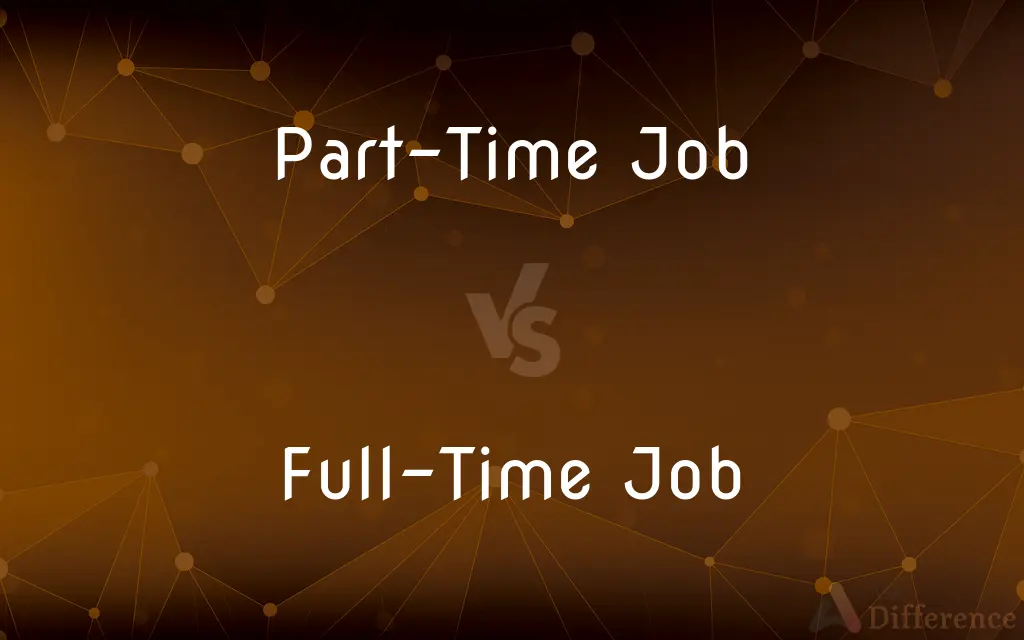Part-Time Job vs. Full-Time Job — What's the Difference?
By Tayyaba Rehman — Published on September 26, 2023
A Part-Time Job requires fewer hours than a standard workweek, while a Full-Time Job typically spans a standard 40-hour workweek or more.

Difference Between Part-Time Job and Full-Time Job
Table of Contents
ADVERTISEMENT
Key Differences
A Part-Time Job typically involves working fewer hours compared to the standard workweek. A Full-Time Job, on the other hand, usually implies working around 40 hours or more per week in the United States.
Individuals in a Part-Time Job might not receive the same benefits as those in a Full-Time Job. Benefits like health insurance, paid leave, and retirement contributions are more commonly associated with full-time positions.
Flexibility can be a hallmark of a Part-Time Job, accommodating other commitments like schooling or another job. Meanwhile, a Full-Time Job might demand a more rigid schedule, emphasizing consistency and regularity.
From an employer's perspective, hiring part-time can provide flexibility in managing labor costs. However, Full-Time Job positions are often seen as investments in long-term, stable employees.
Commitment levels might differ: a Part-Time Job might be short-term or seasonal, while a Full-Time Job often implies a more permanent and ongoing relationship with the employer.
ADVERTISEMENT
Comparison Chart
Hours per Week
Fewer than standard workweek hours
Typically 40 hours or more
Benefits
Often fewer or none
Typically includes health, leave, etc.
Flexibility
Generally more flexible
Often more structured and consistent
Employer's View
Cost-effective, flexible staffing
Long-term investment in an employee
Commitment
May be temporary or seasonal
Typically more permanent and stable
Compare with Definitions
Part-Time Job
A job with fewer hours than a full-time position.
She took a Part-Time Job to balance her studies.
Full-Time Job
A long-term, stable employment position.
She values the stability her Full-Time Job brings.
Part-Time Job
Employment offering more flexible hours.
A Part-Time Job allows her to care for her children during the day.
Full-Time Job
Job with a standard or more extended workweek.
His Full-Time Job sometimes requires overtime.
Part-Time Job
Work that doesn't span the standard workweek.
He preferred a Part-Time Job to spend time on his startup.
Full-Time Job
Typically offers more benefits than part-time positions.
A Full-Time Job at the firm includes retirement contributions.
Part-Time Job
Typically a non-permanent position with fewer benefits.
She sought a Part-Time Job for the summer break.
Full-Time Job
A primary source of employment and income.
Her Full-Time Job offers comprehensive health benefits.
Part-Time Job
Job with limited weekly commitments.
His Part-Time Job at the bookstore gives him extra spending money.
Full-Time Job
A position requiring about 40 hours of work weekly.
He landed a Full-Time Job right after graduation.
Common Curiosities
Do Full-Time Jobs always come with benefits?
While common, not all Full-Time Jobs offer benefits. It depends on the employer and the position.
Is it common to hold more than one Part-Time Job?
Yes, some individuals hold multiple Part-Time Jobs to meet financial needs or for varied experiences.
Can a Part-Time Job turn into a Full-Time Job?
Yes, some employers offer full-time positions to part-time workers based on performance and need.
Can one receive health benefits in a Part-Time Job?
Some employers offer benefits to part-timers, but it's less common than with Full-Time Jobs.
Can students manage a Full-Time Job?
It's challenging. Most students opt for Part-Time Jobs to balance work and studies.
Do Part-Time Jobs always have fixed hours?
No, hours for a Part-Time Job can vary and might not always be fixed.
Do Full-Time Jobs offer more job security?
Generally, Full-Time Jobs are seen as more stable, but job security varies by company and industry.
Which pays more, a Part-Time or Full-Time Job?
Hourly wages vary, but Full-Time Jobs typically offer a higher total income due to more hours worked.
Is overtime common in Full-Time Jobs?
It varies. Some Full-Time Jobs require overtime, while others strictly adhere to regular hours.
How many hours a week defines a Full-Time Job?
In the U.S., a Full-Time Job is typically around 40 hours a week.
Share Your Discovery

Previous Comparison
Look vs. See
Next Comparison
Blunderous vs. LubberlyAuthor Spotlight
Written by
Tayyaba RehmanTayyaba Rehman is a distinguished writer, currently serving as a primary contributor to askdifference.com. As a researcher in semantics and etymology, Tayyaba's passion for the complexity of languages and their distinctions has found a perfect home on the platform. Tayyaba delves into the intricacies of language, distinguishing between commonly confused words and phrases, thereby providing clarity for readers worldwide.
















































